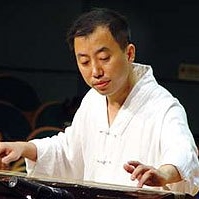Mao Yi
Organized by 黑猫不是喵 on 2022-08-26

Mao Yi, a native of Lushan Mountain. Famous guqin player, Shan Zhuqin. His ancestral home is Jinan, Shandong, and he is the first in a scholarly family. Born in Shanghai in 1968, he moved to Nanjing. Graduated from the piano tuning major of the Central Japan Musical Instrument College and the composition and theory major of the Nanjing University of the Arts. He is a registered senior tuning lawyer of the Ministry of Light Industry, a director of the Chinese Guqin Society, the twelfth-generation descendant of the Guangling School, and the sixth-generation descendant of the Zhucheng School. At the same time proficient in Guqin repair and production.
He studied violin and piano performance since childhood. At the age of ten, he studied Guqin with his grandmother, Mr. Gao Songru, the fifth-generation pianist of the Zhucheng School. At the age of eighteen, he studied Guqin performance and piano learning with the eleventh-generation master of the Guangling School, Mr. Mei Yueqiang. Research, which lasted twenty years, has been playing the piano continuously. During this period, he also received guidance from his predecessors, such as the famous guqin masters Gong Yi and Chen Yuecong.
In 1988, he began to study the production of guqin, and received the guidance and affirmation of Mr. Mei Yueqiang. After more than ten years of continuous efforts and improvements, the guqin-making skills became more and more mature, and finally formed his own style of guqin making: excellent selection of materials and exquisite production. , following the tradition, and chasing the Tang and Song Dynasties; the guqin made, upholds the sound of warmth and restraint, tranquility and harmony, and does not seek to be empty and grand, gorgeous and floating.
The playing style of Guqin combines the strengths of Zhucheng and Guangling schools.
Similar artist
Yang Qing, a famous guqin master and music educator, was born in August 1951.
read >>
Ni Shiyun, a native of Haimen District, Nantong City, Jiangsu Province, China's famous contemporary qin mojo, the fourth generation inheritor of the Mei 'an Qin School, the representative inheritor of the intangible cultural heritage of Jiangsu Province "Guqin art" (Mei 'an Qin school), serves as the director of the Chinese Kunqu Opera Guqin Research Institute and the executive director of the Chinese Qin Association.
read >>
Yang Qiong, the word Yu Rong, Yushan Qin school successor, South Yuqin Club president, operation aman for more than ten years, good at qin songs. He is currently the vice president of Shenzhen Guqin Association, member of Shenzhen Ethnic Orchestral Association, lecturer of Shenzhen University School of Continuing Education and so on.
read >>
Yang Zhijian, Guqin maker and performer. Born in Shanghai in July 1974. National first-class performer; representative inheritor of Shanghai intangible cultural heritage "Guqin-making skills"; vice-chairman of Shanghai Intangible Cultural Heritage Protection Association. Winner of "Shanghai Craftsman" and "May 1st Labor Medal" in 2017.
read >>
Huang Deyuan, inheritor of the intangible cultural heritage "Zhejiang style guqin" and "Wenzhou dialect recitation".
read >>
Involving musical instruments
Guqin (pinyin: Gǔ Qín) is a traditional Chinese musical instrument with a history of at least 3,500 years. Guqin is also known as Yaoqin, Yuqin and Seven-stringed Qin. The guqin has 13 emblems that mark the rhythm, and is also a ritual and musical instrument. It belongs to the silk in the octave. Guqin has a wide range, deep timbre and long aftertone.
Involved portfolio
Involved news
Organized by 陆晨 on 2025-04-17
The guqin, as a treasure of traditional Chinese culture, with its unique timbre and profound cultural background, has become a choice for many people to pursue inner peace. However, for many enthusiasts, how to squeeze out time from a busy schedule to self-study the guqin is no small challenge.
read >>
Organized by 苏肆 on 2025-04-03
In the long river of ancient Chinese music, Guqin occupies an irreplaceable position with its profound cultural connotation and unique timbre. Among the many famous Guqin songs, "Snow White" is like a bright pearl, with its quiet and elegant style, it has become a classic beloved by scholars of all ages.
read >>
Organized by 没头脑 on 2025-03-31
"Autumn Wild Geese" is a brilliant gem in the treasure house of ancient Chinese guqin music. It is not only renowned worldwide for its profound and distant artistic conception, but also has become a classic work passed down by later generations due to its unique artistic charm and profound ideological connotation.
read >>
Organized by 天井 on 2025-03-07
The guqin, as a treasure among traditional Chinese musical instruments, with its profound timbre and rich cultural connotations, has become an important medium for scholars and refined people to cultivate their character and express their sentiments. Among the numerous guqin pieces, "Pu'an Zuo" stands out as a highly representative work with its unique Buddhist background and the distant and meditative musical style.
read >>
Organized by 肖毅 on 2025-02-26
In the vast starry sky of Chinese classical music, guqin pieces occupy an important place with their profound cultural background and unique artistic charm. Among them, "The Four Scenic Views" is a highly representative work that not only showcases the exquisite and far-reaching artistic conception of guqin music but also leads the listener into a world brimming with vitality and vigor.
read >>

 渝公网安备 50010702504639号
渝公网安备 50010702504639号